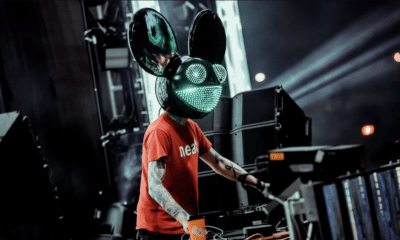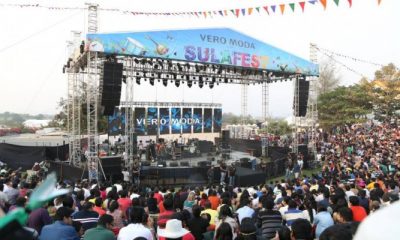Sound Plunge
Inside the Mind of a Resident DJ
“I’m standing next to (Dutch producer) Ferry Corsten at the console and a lady comes up and asks him to play ‘Amplifier’.”
“Once, when I was playing my usual set, a girl came up to me and asked me to play something ‘banging’. I said I’ll play ‘something banging’ after a while because it was only 10 pm at that time. I told them they could get to hear what they wanted once the night picked up. They then told me they had to leave early and that’s why they wanted to hear the song right then”, says Ashim Das, presently a resident DJ at one of Delhi’s high-end opulent night clubs Pangaea, who’s had the misfortune of listening to the funniest things people say at clubs in his nearly 12-year long stint as a DJ across various clubs in India and Asia. It’s not as much ‘funny’, after a point, as it is disheartening and humiliating. He says, “I wanted to tell them that I’m not a juke box. They’re not musically literate (so) they don’t see a DJ as an artist. To survive, you have to deal with that.”

DJ Ashim
Ashim Das, a Delhi-based DJ, who started DJing at the age of 16 after taking an instant liking to techno and house varieties by international producers like Carl Cox, John Digweed, and Sasha, has achieved residency in few of Delhi’s most esteemed clubs. Playing at Delhi’s F-Bar for five years and B-Bar soon after, was only a stepping stone until he moved to international shores like Bangkok where he played at popular clubs including Placebo, Insomnia and Wax. The touring, the playing, the dedication and a resultant partial deafness still bore him tepid acclaim. He recalls an incident of the time when he moved to play at clubs in Gurgaon, “The money and music was good. (But) in Gurgaon, every Tom, Dick and Harry is a DJ who keeps poking you to play ‘this or that song’.” Not many respect and trust the rhythm and skill of a DJ, who’s been hired to play.
Pangaea, home to Delhi’s privileged clubber, is a name that has grown to become synonymous with high-end lifestyle – much like Mumbai’s Intercontinental Dome or Bangalore’s Chancery Pavilion. DJing for his bread and butter, Ashim says he’s been lucky with gigs since the time he first touched the console. There hasn’t been a moment of unemployment, jumping from one club to the other, having played at over 60 clubs, locally and internationally. From 2011, he has performed in Singapore, Cambodia, Malaysia and Djakarta, all in a span of one and half years, following which he got a call from Pangaea to play as a resident DJ, which he took up in October 2013.
“If you want to be in the market, you have to do residency.” While brand Pangaea is doing him good, his contract ties him, which holds true for any club. “If I’m a resident DJ, I can’t do private gigs in Delhi. They (the clubs) don’t allow it. It says so in my contract. See, I get a lot of calls for performances, but because of the club’s policy I cant.” Despite the strict rules, he makes it a point to adhere to them for brand building and paying his bills. “If I want to buy a sound card, it costs me Rs. 70,000 or a monitor costs Rs. 80,000. Soundproofing my place costs nearly Rs. 50,000.” Thus, to strike a balance between recognition and survival, the next step is music production.
Today, the 30-year old DJ feels he’s finally learnt enough to begin his production venture. Only DJing, in India, will not give him the credit he deserves. Apart from his regular podcast, which Pangaea releases and promotes, Ashim is all set to begin working on his mash-ups and bootlegs this year, after which he plans to release an original single. He has also taken an evident notice of the indie electronica biggies like Dualist Inquiry and Nucleya. “I like Nucleya. His production is very tight – Hindi lyrics with bass lines act as a plus point.” To be only a DJ and gain respect in our country is an uphill task. While he may feel that, he has learnt to neglect any insults that border on the lines of – A DJ just has to hit play.
What many don’t realize is DJs have it tough on their ears. Ashim rehearses for nearly 12 hours a day, every day, due to which he’s developing Tinnitus. Tinnitus is a hearing disability wherein one cannot hear below a certain decibel and a constant ringing sensation grips the hearing. He knows that one of his ears is approaching partial deafness. It isn’t a hindrance per se for distinguishing music, but it can have long terms repercussions like complete deafness, which is something he fears as well. For now, special plugs and adjusting levels on the equalizer are precautionary measures to delay the impairment.
But what unnerves him most is when international producers of the likes of Avicii or Deadmau5 visit India, and don’t do justice with their live DJ sets. While the frenzy international DJ-producers stoke in the hearts of EDM-obsessed crowds in India is heart-warming due to a growing appreciation of other-than-Bollywood music (nearly 7 years with Sunburn, read more here), it’s following a dangerously similar pattern. EDM, or better known as bubble gum/pop music worldwide, is merely being reduced to a commodity. Ashim says, “Deadmau5 came to India and played a shit set. I’ve had arguments with a lot of my friends. He is not playing original music that he plays at festivals in other countries. Why do these international artists think India is still backward?” referring to the presumed indiscernibility of our larger, upwardly mobile crowds.

The gimmicks of Deadmau5
Indian DJs-producers like Arjun Vagale, Kohra, BLOT!, Vinayak A, and many such names are going unnoticed in the Indian market. The infatuation with outsiders doesn’t fit too well within the framework of Ashim’s understanding. Elaborating further on Deadmau5’s India visit, he says, “If I go and ask them (people) if they know what music he is playing, they won’t know. In India, if you have a big name people think you are good. ‘Levels’ was one hit. So now people think they should go and listen to him live. (Then) what is the difference between a resident DJ and an Avicii?” He added that if artists like Avicii, Mark Knight or David Guetta do not bring more to the table than what people already know then they’re not worth the exorbitant amounts they’re paid for their live shows.
As a trickle-down effect Ashim feels that such behaviour by big international acts further diminishes the value of an Indian DJ. For instance, a Paul Van Dyk fan goes to watch him live and returns disappointed. This fan now forms his perception that Paul Van Dyk (PVD) sounds better on the stereo. This same fan thinks, if PVD wasn’t great live, what good is an Indian DJ? “PVD is usually known for his emotional vibe. He had no energy at Sunburn. I think because of that, Indian DJs are getting further disrespected.” In fact, sometime late last year, DJ Reji Ravindran, audio visual duo BLOT! and electronica producer Karsh Kale came out on separate occasions to express the lack of respect accorded to DJs in India (read here).
While urban clubbers at large find it hard to acknowledge a DJ as an artist instead of a jukebox, rumours are that a few celebrity DJs, who’ve got their fingers in the Sunburn pie, pay money to open for internationally renowned artists at the festival. At the end of the day, for a DJ, professionally speaking, it’s paramount to have opened for a big act to mark credibility. And nothing adds more weightage than that. Also, a certain organizer/DJ in India is said to buy tracks off young producers and pass it off under his name; ghost production essentially, which is even rumoured to take place between international big-wigs like Nicky Romero and David Guetta, where the former produces and sells to the latter.
The hearsay and Chinese whispers about DJs finding a spot commercially are manifold. But after all this disregard for a DJ, where do they see themselves going, especially when they set out to dedicate their lives to entertaining crowds.
There’s a party happening in our city, a resident DJ is playing and the entire town is going. But who’s going for the DJ?









































Pingback: DJs Officially Recognized as Skilled Workers in the United Kingdom